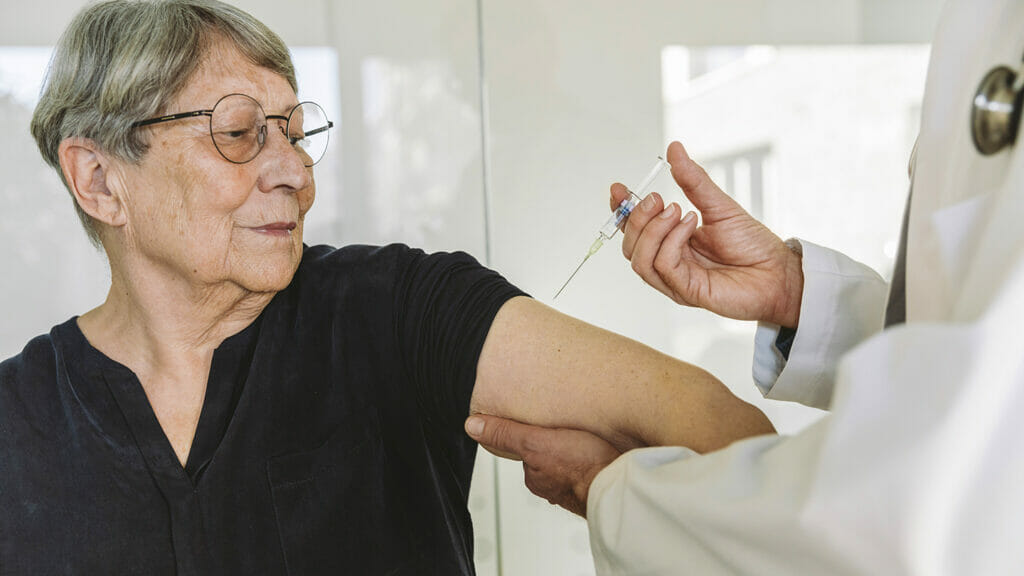
COVID-19 and respiratory syncytial virus cases are increasing, and the height of influenza season is on the horizon, but older adults and long-term care staff members are entering the first virus season in which vaccines are available for all three viruses responsible for the most hospitalizations.
The Centers for Disease Control and Prevention Office of Readiness and Response laid out the agency’s recommendations for flu, COVID-19 and RSV vaccines for older adults during a clinician outreach and communication activity call on Tuesday.
Influenza vaccines
Flu vaccination is recommended for everyone aged more than 6 months. Studies show older adults account for 54% to 70% of flu-related hospitalizations and 71% to 85% of flu-related deaths, said Lisa Grohskopf, MD, MPH, medical officer of the influenza division of the CDC’s National Center for Immunization and Respiratory Diseases.
This year, recommendations were updated regarding vaccine composition for 2023-2024, and changes were made to recommendations for people allergic to eggs.
Specifically, preferred vaccinations for older adults include the standard-dose adjuvanted or high-dose inactivated quadrivalent vaccines, or the recombinant quadrivalent vaccine — the latter being the only preferred vaccine that is not egg-based.
Experts also recommend flu vaccines in September or late fall due to the potential waning of immunity. The updated recommendations also indicate that individuals with egg allergy should be treated no differently than other recipients of any other vaccine, with no additional safety measures required.
COVID-19 vaccines
Although the burden of COVID-19 varies by age and underlying conditions, older adults and those who have multiple underlying conditions have the highest risk of severe outcomes. Megan Wallace, DrPH, MPH, a CDC epidemiologist, said that the number of COVID cases is lower than at previous points in the pandemic, but experts continue to see thousands of hospitalizations and hundreds of deaths weekly from the virus, particularly in those 75 and older.
Vaccination with the updated COVID-19 vaccine is recommended, according to the CDC, because vaccine and infection-induced immunity wanes and because new variants continue to emerge, suggesting that susceptibility remains and may increase over time. Millions of COVID-19 vaccines have been administered over three years, proving their safety profile, Wallace added.
Key changes to the 2023-2024 mRNA vaccine recommendations include that anyone aged five or more years receive a single dose regardless of prior vaccination history, although additional doses may be recommended in the future based on epidemiology and vaccine effectiveness.
Under general best practice guidelines for immunization, routine administration of all age-appropriate doses of vaccines — COVID-19, flu and RSV — simultaneously is recommended if no contraindications exist at the time of vaccination.
This year’s COVID-19 vaccines are the first to be available directly from the manufacturers as part of the commercial market rather than through the federal government.
RSV vaccines
Although RSV is a familiar viral infection, Amadea Britton, MD/SM, medical officer of the CDC’s Coronavirus and Other Respiratory Viruses Division, said that it is an important cause of respiratory illness in older adults.
Older adults typically account for 60,000 to 160,000 RSV-related hospitalizations annually, and 6,000 to 10,000 deaths. Chronic underlying conditions are associated with increased risk of severe RSV disease, along with living in a senior living community or nursing home, frailty and advanced age.
In June, the CDC signed off on a recommendation from the Advisory Committee on Immunization Practices for a single dose of RSV vaccines for older adults. Studies found the vaccines to be generally well-tolerated, with common side effects similar to other vaccines, including pain at injection site, fatigue, headache, muscle pain and joint pain.
The ACIP and CDC recommend that adults aged 60 or more years receive a single dose of the RSV vaccine using shared clinical decision-making with their healthcare provider. RSV vaccination should be administered as soon as the vaccine is offered each summer.
Vaccine hesitancy
Talking about vaccines can be a challenge, said Joellen Wolicki, BSN, RN, a nurse educator with the National Center for Immunization and Respiratory Diseases.
“The biggest challenge is, knowledge does not equal behavior,” she said. “And it matters who the message is coming from and how it’s communicated.”
A broad range of socio-psychological determinants contribute to vaccine hesitancy, including attitudes, past experiences, trust, social norms, moral values and world views, Wolicki said.
The CDC recommends that healthcare providers give a strong recommendation for vaccination using the presumptive approach, which assumes that someone will choose to get vaccinated. In some cases, motivational interviewing — collaborative communication to guide people toward change or action — might be more effective. Studies using motivational interviewing with vaccination decisions showed increased intent to vaccinate and improved vaccination rates, Wolicki said.
This article originally appeared on McKnight's Senior Living





